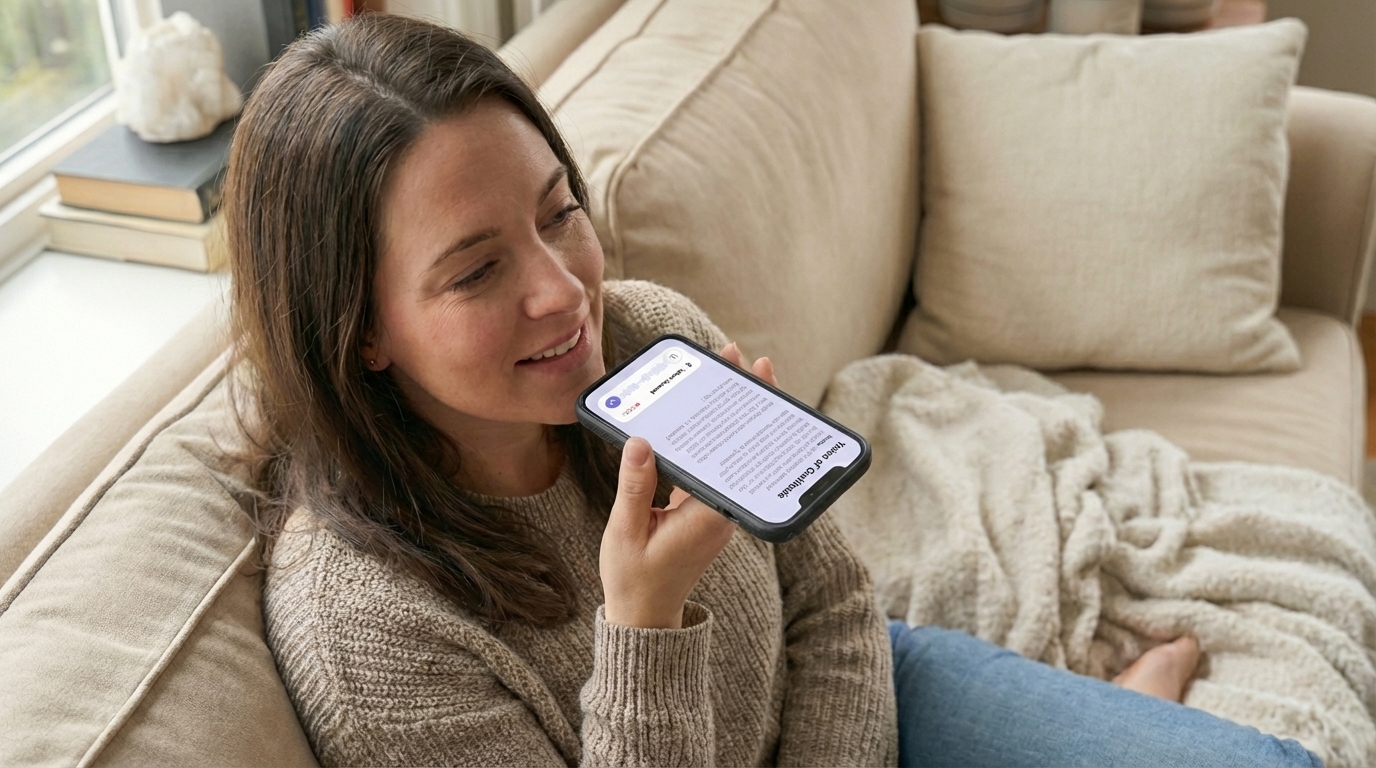
Journaling is one of the most effective tools for self
-discovery, but let’s face it: sometimes the friction of writing stops us before we even begin. Staring at a blank page can be intimidating, and typing out long paragraphs on a smartphone screen often feels like a chore.
Enter voice journaling.
Voice journaling (or audio journaling) removes the barrier between your thoughts and your entry. It allows you to capture your stream of consciousness at the speed of speech, preserving not just what you say, but how you say it.
At Reflection, we believe in making self-reflection accessible. Whether you are a lifelong writer or someone who struggles to put pen to paper, here is why switching to your voice might be the breakthrough your practice needs.
What is Voice Journaling?
At its simplest, voice journaling is the act of recording your spoken thoughts instead of writing or typing them. It is a modern evolution of the traditional diary, utilizing the microphone in your pocket to capture your day, your mood, and your anxieties.
While voice memos have existed for years, modern voice journaling has evolved. It is no longer just about hoarding audio files; it is about using technology—specifically AI—to capture, transcribe, and organize those spoken thoughts into meaningful insights.
The Psychology Behind Speaking vs. Writing
Why does speaking feel different than writing?
When we write, we often self-edit. We worry about grammar, sentence structure, and coherence. This "internal editor" can block our deepest truths from surfacing.
Speaking engages a different part of the brain. It tends to be faster and more fluid. When you speak, you often bypass that internal filter, allowing for a true stream of consciousness. This can lead to a cathartic release, which is often necessary when doing deep emotional work or shadow work journaling.
5 Key Benefits of Starting an Audio Diary
If you are on the fence about talking to your phone, consider these benefits. While there are many general benefits of journaling, voice journaling offers unique advantages:
1. Speed and Efficiency
The average person types on a mobile device at about 40 words per minute but speaks at around 150 words per minute. Voice journaling allows you to capture a high volume of thought in a fraction of the time. It is perfect for the morning commute or a quick brain dump before bed.
2. Accessibility and Ease
For those who struggle with sitting still to write, voice journaling
makes the practice inclusive. It is particularly effective for neurodivergent minds. In our guide to journaling for ADHD, we highlight how audio capture helps bypass the executive dysfunction that often hinders traditional writing.
3. Capturing Emotional Nuance
Text can be flat. When you read an entry from three years ago, you might read the words, but you miss the feeling. Audio captures the tremor in your voice, the excitement, the hesitation, and the relief. It adds a high-fidelity layer to your memories.
4. Reduced Friction
The best journal is the one you actually use. By removing the need to sit down and type, you lower the activation energy required to start. You can voice journal while walking the dog, folding laundry, or driving.
5. Therapeutic Release
There is a reason talk therapy works. Vocalizing problems helps externalize them. Hearing yourself say, "I feel overwhelmed because..." often brings immediate clarity that thinking in loops does not.
How to Start a Voice Journaling Routine
Starting is as easy as opening your app and hitting record, but here are a few tips to make it stick:
- The "Walk and Talk": Combine mindfulness with movement. Go for a 10-minute walk and record your thoughts. The physical movement often helps loosen mental blocks.
- Use a Prompt: If you feel awkward talking to yourself, pretend you are answering a question or narrating a message to your future self (similar to writing a letter to your future self, but spoken).
- Don't Stop for Pauses: Silence is part of the process. If you fall silent for 10 seconds, let the recording run. Often, the most profound insight comes right after the silence.
From Rambling to Clarity: The Role of AI in Voice Journaling
The historical downside of audio diaries was searchability. It is difficult to "skim" an audio file to find that one realization you had last month.
This is where Reflection bridges the gap.
We didn't just build a voice recorder; we built an Enhanced Voice Journaling experience. When you record a voice note in Reflection, two things happen:
- We transcribe your audio securely.
- Our AI helps organize your rambles into a coherent, structured entry.
This means you get the emotional release of speaking and the organized clarity of
writing. While there are many AI journaling apps on the market, Reflection is designed to help you search your spoken entries just like text, finding patterns across years of voice notes.
Voice Journaling FAQs
Is voice journaling better than traditional writing?
Neither is inherently "better," but they serve different needs. Voice journaling is often superior for emotional release, speed, and overcoming writer's block or perfectionism. Traditional writing is often better for slow, deliberate structuring of complex arguments. Many users find a hybrid approach works best.
What if I hate the sound of my own voice?
This is a very common hesitation known as "voice confrontation." The beauty of modern voice journaling with Reflection is that you don't actually have to listen to the recording if you don't want to. Our app transcribes your speech into text, so you can vent verbally to get the emotion out, and then review the text transcript for insights later.
What is the best app for voice journaling?
While you can use generic voice memo apps, Reflection is designed specifically for the journaling use case. If you are comparing options, you can check our guide to the best journaling apps, but Reflection stands out because it combines secure encryption, automatic transcription, and AI insights to help you understand the patterns in your spoken words.
Can I combine voice and text in the same entry?
Yes. A popular method is the "blurt and refine" technique. You can start an entry by speaking to capture your raw feelings quickly. Once transcribed, you can switch to typing to edit, expand, or reflect on what you just said. This prevents the "blank page syndrome" that stops many people from starting.
Is my audio data private?
Privacy is the most important feature of any journal. Reflection uses AES-256 encryption (bank-grade security). Your entries—whether voice recordings or text transcripts—are private and encrypted. We do not sell user data, and your personal reflections remain for your eyes (and ears) only.
How accurate is the AI transcription?
Technology has improved drastically in recent years. Reflection utilizes advanced AI that is highly accurate at capturing natural speech, including pauses and natural cadence. While no AI is 100% perfect, it allows you to speak naturally without worrying about dictating punctuation.
Ready to speak your mind?
Your voice is a powerful tool for growth. By incorporating voice journaling into your routine, you can capture the fullness of your life experience with less friction and more feeling.
Download Reflection today on iOS, Android, or Mac and try your first Enhanced Voice Journal entry.
{
"@context": "https://schema.org",
"@type": "FAQPage",
"mainEntity": [
{
"@type": "Question",
"name": "Is voice journaling better than traditional writing?",
"acceptedAnswer": {
"@type": "Answer",
"text": "Neither is inherently \"better,\" but they serve different needs. Voice journaling is often superior for emotional release, speed, and overcoming writer's block or perfectionism. Traditional writing is often better for slow, deliberate structuring of complex arguments. Many users find a hybrid approach works best."
}
},
{
"@type": "Question",
"name": "What if I hate the sound of my own voice?",
"acceptedAnswer": {
"@type": "Answer",
"text": "This is a very common hesitation known as \"voice confrontation.\" The beauty of modern voice journaling with Reflection is that you don't actually have to listen to the recording if you don't want to. Our app transcribes your speech into text, so you can vent verbally to get the emotion out, and then review the text transcript for insights later."
}
},
{
"@type": "Question",
"name": "What is the best app for voice journaling?",
"acceptedAnswer": {
"@type": "Answer",
"text": "While you can use generic voice memo apps, Reflection is designed specifically for the journaling use case. If you are comparing options, you can check our guide to the best journaling apps, but Reflection stands out because it combines secure encryption, automatic transcription, and AI insights to help you understand the patterns in your spoken words."
}
},
{
"@type": "Question",
"name": "Can I combine voice and text in the same entry?",
"acceptedAnswer": {
"@type": "Answer",
"text": "Yes. A popular method is the \"blurt and refine\" technique. You can start an entry by speaking to capture your raw feelings quickly. Once transcribed, you can switch to typing to edit, expand, or reflect on what you just said. This prevents the \"blank page syndrome\" that stops many people from starting."
}
},
{
"@type": "Question",
"name": "Is my audio data private?",
"acceptedAnswer": {
"@type": "Answer",
"text": "Privacy is the most important feature of any journal. Reflection uses AES-256 encryption (bank-grade security). Your entries—whether voice recordings or text transcripts—are private and encrypted. We do not sell user data, and your personal reflections remain for your eyes (and ears) only."
}
},
{
"@type": "Question",
"name": "How accurate is the AI transcription?",
"acceptedAnswer": {
"@type": "Answer",
"text": "Technology has improved drastically in recent years. Reflection utilizes advanced AI that is highly accurate at capturing natural speech, including pauses and natural cadence. While no AI is 100% perfect, it allows you to speak naturally without worrying about dictating punctuation."
}
}
]
}
Journaling is one of the most effective tools for self
-discovery, but let’s face it: sometimes the friction of writing stops us before we even begin. Staring at a blank page can be intimidating, and typing out long paragraphs on a smartphone screen often feels like a chore.
Enter voice journaling.
Voice journaling (or audio journaling) removes the barrier between your thoughts and your entry. It allows you to capture your stream of consciousness at the speed of speech, preserving not just what you say, but how you say it.
At Reflection, we believe in making self-reflection accessible. Whether you are a lifelong writer or someone who struggles to put pen to paper, here is why switching to your voice might be the breakthrough your practice needs.
What is Voice Journaling?
At its simplest, voice journaling is the act of recording your spoken thoughts instead of writing or typing them. It is a modern evolution of the traditional diary, utilizing the microphone in your pocket to capture your day, your mood, and your anxieties.
While voice memos have existed for years, modern voice journaling has evolved. It is no longer just about hoarding audio files; it is about using technology—specifically AI—to capture, transcribe, and organize those spoken thoughts into meaningful insights.
The Psychology Behind Speaking vs. Writing
Why does speaking feel different than writing?
When we write, we often self-edit. We worry about grammar, sentence structure, and coherence. This "internal editor" can block our deepest truths from surfacing.
Speaking engages a different part of the brain. It tends to be faster and more fluid. When you speak, you often bypass that internal filter, allowing for a true stream of consciousness. This can lead to a cathartic release, which is often necessary when doing deep emotional work or shadow work journaling.
5 Key Benefits of Starting an Audio Diary
If you are on the fence about talking to your phone, consider these benefits. While there are many general benefits of journaling, voice journaling offers unique advantages:
1. Speed and Efficiency
The average person types on a mobile device at about 40 words per minute but speaks at around 150 words per minute. Voice journaling allows you to capture a high volume of thought in a fraction of the time. It is perfect for the morning commute or a quick brain dump before bed.
2. Accessibility and Ease
For those who struggle with sitting still to write, voice journaling
makes the practice inclusive. It is particularly effective for neurodivergent minds. In our guide to journaling for ADHD, we highlight how audio capture helps bypass the executive dysfunction that often hinders traditional writing.
3. Capturing Emotional Nuance
Text can be flat. When you read an entry from three years ago, you might read the words, but you miss the feeling. Audio captures the tremor in your voice, the excitement, the hesitation, and the relief. It adds a high-fidelity layer to your memories.
4. Reduced Friction
The best journal is the one you actually use. By removing the need to sit down and type, you lower the activation energy required to start. You can voice journal while walking the dog, folding laundry, or driving.
5. Therapeutic Release
There is a reason talk therapy works. Vocalizing problems helps externalize them. Hearing yourself say, "I feel overwhelmed because..." often brings immediate clarity that thinking in loops does not.
How to Start a Voice Journaling Routine
Starting is as easy as opening your app and hitting record, but here are a few tips to make it stick:
- The "Walk and Talk": Combine mindfulness with movement. Go for a 10-minute walk and record your thoughts. The physical movement often helps loosen mental blocks.
- Use a Prompt: If you feel awkward talking to yourself, pretend you are answering a question or narrating a message to your future self (similar to writing a letter to your future self, but spoken).
- Don't Stop for Pauses: Silence is part of the process. If you fall silent for 10 seconds, let the recording run. Often, the most profound insight comes right after the silence.
From Rambling to Clarity: The Role of AI in Voice Journaling
The historical downside of audio diaries was searchability. It is difficult to "skim" an audio file to find that one realization you had last month.
This is where Reflection bridges the gap.
We didn't just build a voice recorder; we built an Enhanced Voice Journaling experience. When you record a voice note in Reflection, two things happen:
- We transcribe your audio securely.
- Our AI helps organize your rambles into a coherent, structured entry.
This means you get the emotional release of speaking and the organized clarity of
writing. While there are many AI journaling apps on the market, Reflection is designed to help you search your spoken entries just like text, finding patterns across years of voice notes.
Voice Journaling FAQs
Is voice journaling better than traditional writing?
Neither is inherently "better," but they serve different needs. Voice journaling is often superior for emotional release, speed, and overcoming writer's block or perfectionism. Traditional writing is often better for slow, deliberate structuring of complex arguments. Many users find a hybrid approach works best.
What if I hate the sound of my own voice?
This is a very common hesitation known as "voice confrontation." The beauty of modern voice journaling with Reflection is that you don't actually have to listen to the recording if you don't want to. Our app transcribes your speech into text, so you can vent verbally to get the emotion out, and then review the text transcript for insights later.
What is the best app for voice journaling?
While you can use generic voice memo apps, Reflection is designed specifically for the journaling use case. If you are comparing options, you can check our guide to the best journaling apps, but Reflection stands out because it combines secure encryption, automatic transcription, and AI insights to help you understand the patterns in your spoken words.
Can I combine voice and text in the same entry?
Yes. A popular method is the "blurt and refine" technique. You can start an entry by speaking to capture your raw feelings quickly. Once transcribed, you can switch to typing to edit, expand, or reflect on what you just said. This prevents the "blank page syndrome" that stops many people from starting.
Is my audio data private?
Privacy is the most important feature of any journal. Reflection uses AES-256 encryption (bank-grade security). Your entries—whether voice recordings or text transcripts—are private and encrypted. We do not sell user data, and your personal reflections remain for your eyes (and ears) only.
How accurate is the AI transcription?
Technology has improved drastically in recent years. Reflection utilizes advanced AI that is highly accurate at capturing natural speech, including pauses and natural cadence. While no AI is 100% perfect, it allows you to speak naturally without worrying about dictating punctuation.
Ready to speak your mind?
Your voice is a powerful tool for growth. By incorporating voice journaling into your routine, you can capture the fullness of your life experience with less friction and more feeling.
Download Reflection today on iOS, Android, or Mac and try your first Enhanced Voice Journal entry.
















